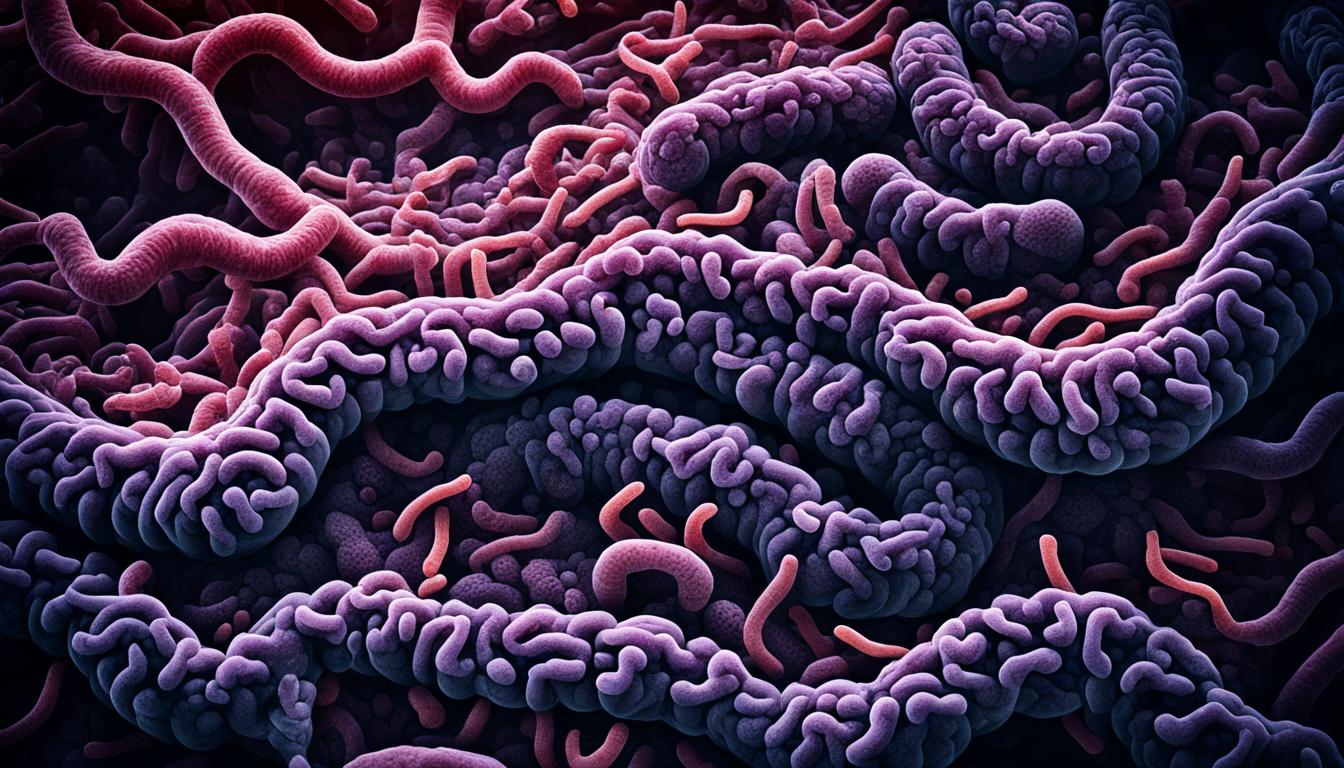Small bowel bacterial overgrowth, known as SIBO, means there are too many bacteria in the small intestine. It can cause many stomach problems and affects people of all ages. Signs of SIBO are a swollen belly, trouble going to the bathroom, and not getting enough nutrients.
Things like celiac disease, Crohn’s disease, and having an unusual intestinal structure can make you more likely to get SIBO. Not having the right balance of good bacteria in your gut, past stomach problems or surgeries, and some drugs can also raise your risk.
Finding out if you have SIBO takes tests like checking the air you breathe out or looking at the tiny intestine’s samples. To deal with SIBO, doctors might suggest taking antibiotics, changing how you eat, or trying new treatments like using stem cells.
- SIBO is characterized by excessive bacterial growth in the small intestine.
- Common symptoms include abdominal bloating, constipation, and nutritional deficiencies.
- Conditions like celiac disease, Crohn’s disease, and blind loop syndrome can contribute to SIBO.
- Disruptions in gut bacteria and certain medications can increase the risk of SIBO.
- Diagnosis involves breath tests and analysis of small intestinal samples.
- Treatment options include antibiotics, dietary changes, and innovative therapies like stem cell therapy.
- Small bowel bacterial overgrowth (SIBO) is characterized by excessive bacterial growth in the small intestine.
- SIBO can lead to symptoms such as abdominal bloating, constipation, and nutritional deficiencies.
- Conditions like celiac disease, Crohn’s disease, and blind loop syndrome can contribute to the development of SIBO.
- Gut bacteria disruptions, a history of digestive disease or related surgeries, and certain medications can increase the risk of SIBO.
- Diagnosis involves breath tests and analysis of samples from the small intestine.
- Treatment options for SIBO include antibiotics, dietary changes, and innovative therapies such as stem cell therapy.
Causes and Risk Factors of Small Bowel Bacterial Overgrowth
Small bowel bacterial overgrowth, or SIBO, happens when there’s too much bacteria in the small intestine. This overflow has many causes. Knowing these helps in finding and treating SIBO better.
Altered Small Intestine Environment
The acidity in the small intestine normally keeps bacteria under control. But, if this balance is off, like when the acidity drops, it’s easier for bacteria to grow.
This might happen due to not making enough stomach acid or using some medicines, like proton pump inhibitors.
Impaired Intestinal Motility
Intestinal muscles move food along in our bodies. This movement, called motility, can slow down in conditions such as gastroparesis. It can also slow after certain surgeries, like gastric bypass or bowel resection.
When food moves slowly, bacteria have more time to grow in the small intestine. This can lead to SIBO.
Dietary Preferences and Infections
Eating a lot of sugary or starchy foods can add to the problem. Also, infections like Helicobacter pylori can upset the natural balance in the gut, making SIBO more likely.
Underlying Health Conditions
Health problems like hypothyroidism can make SIBO more likely. They slow down digestion and decrease some needed enzymes.
This includes conditions where parts of the small intestine don’t function properly, allowing bacteria to grow.
Malabsorption of Nutrients
The extra bacteria in the small intestine can prevent nutrient absorption. This means the body can’t use carbs, proteins, and fats well. As a result, someone might not get enough nutrients, leading to health issues.
Healthcare professionals use this knowledge to diagnose and treat SIBO. They focus on fixing the root issues. This combined with proper treatment can improve gut health and reduce SIBO symptoms.
Treatment and Management of Small Bowel Bacterial Overgrowth
The treatment for small bowel bacterial overgrowth is thorough. It looks at the issues that cause it and the symptoms it brings. Antibiotics are commonly used to fight the extra bacteria in the intestine. They target the harmful bacteria, making the gut healthier and easing digestive problems.
Yet, medication alone doesn’t always solve the problem for good. Changing what you eat is also key to handle SIBO. Health experts often suggest a high-fiber or low-FODMAP diet. This helps to ease the symptoms and create a better environment in the gut. Such diet changes make digestion better and reduce the chance of more bacteria growing.
stem cell therapy, are being looked into for SIBO. Stem cell therapy tries to heal and renew the injured parts of the small intestine. It aims to bring back its natural state and function. Even though it’s in the early stages of research, stem cell treatment shows a hopeful future. It could change how we treat SIBO and enhance the results for patients.
Focusing on the root causes of bacterial overgrowth is also vital. It’s critical to keep a check and stay in touch with health experts regularly. This way, SIBO can be managed well. Taking steps before problems get serious is important. It not only avoids complications but also boosts overall gut health. This, in turn, makes life better for those dealing with SIBO.

